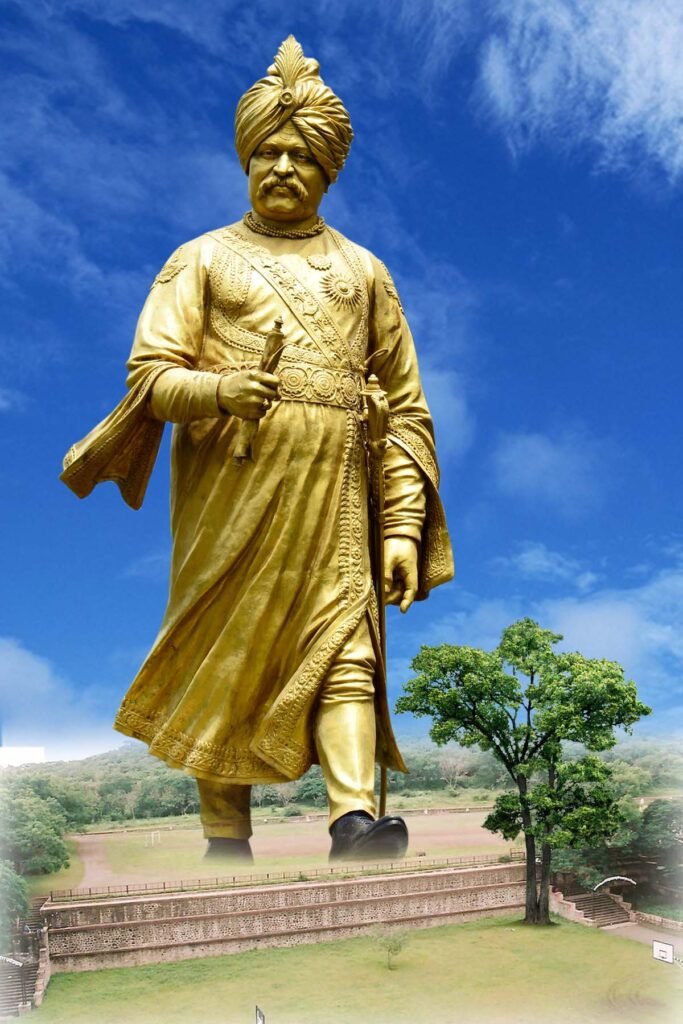Brief History of the Parishad
Akhil Bharatiya Maratha Shikshan Parishad is an offshoot of the reformist thoughts initiated and spread by great revolutionaries like Mahatma Jyotiba Phule who established the ‘Satyashodhak Samaj’ and created awareness about the significance of education. Shrimant Sayajirao Gaikwad of Baroda too contributed greatly to the educational upliftment of the ordinary masses. A well-known advocate from Pune Mr. Gangaram Bhau Mhaske duly felt the need for the spread of English education amongst people. However at the same time he felt the economic backwardness of people and the expensive nature of English education and in order to resolve this impasse, in 1885 he founded ‘Deccan Association’ and raised funds for mass education. Shrimant Sayajirao Gaikwad started an annual grant for the Association and supported it greatly. Great King of Kolhapur, Rajarshi Shahu Maharaj too sanctioned grants to the institute.
Rajarshi Shahu had undertaken the task of the upliftment of the socially and economically backword sections of society. In 1901 he set up a Students’ Hostel where children from all walks of life and all castes were admitted. It was indeed a great revolutionary step ahead in the path of social progress. And such revolutionary acts gave way to a public discussion in the newspapers on the need for an Association/Federation of the backward classes. Shri Narayan Lokhande in his paper ‘Deenbandhu’ initiated such discussion which was positively responded to by Shrimant Sayajirao Gaikwad with an assurance of financial support. In one of his editorials in 1906 Shri Lokhande mentioned that there was a need for a social and educational institute which would not delimit its efforts to just one or the other community but would adopt an all inclusive, comprehensive approach which would understand and incorporate all the backward sections of the nation equally. This revolutionary thought led to the organisation of the very first educational conference in 1907 at Dharvad.

Thus the A.B.M.S. Parishad is the oldest educational institute founded in the first decade of the 20th Century. It is undoubtedly the “mother institute” of many other educational institutes in Maharashtra. The Parishad with the able efforts by various social reformists, revolutionaries and intellectuals including journalists like Mr. Lokhande and Mr. Bhagvanrao Patekar of ‘Jagriti’ initiated a great social, educational movement in the 20th century. Remarkably enough it was a joint venture which included the ordinary, common masses as well as the rulers. Accordingly on account of such joint and honest efforts academic programmes began all over; boardings, schools and colleges were established and obviously society started adopting a progressive look.
Today all over Maharashtra there is a great network of educational institutions viz. Shri Shivaji Maratha Society, Pune; Maratha Shikshan Prasarak Mandali, Solapur; Maratha Vidya Prasarak Samaj, Jalgaon; Maratha Unnati Samaj, Nagpur; Shri Shivaji Maratha Society, Amaravati; Shri Shahu Maratha Boarding, Baramati; Many more institutes have been functional at Mumbai, Nashik, Dhule, Dharvad, Jabalpur, Zat, Akkalkot, Ichalkaranji, Bhusawal etc. All these institutions have their roots in the A.B.M.S. Parishad, Pune.
It was indeed remarkable that this mass movement of education and social progress was promoted and encouraged by the rulers who did not want their subject to remain ignorant and blind. Contrary to ordinary rulers who sought their own well-being at the cost of their people these rulers like Rajarshi Shahu Maharaj of Kolhapur, Shrimant Sayajirao Maharaj Gaikwad of Baroda and Shrimant Alijabahadur Madhavrao Maharaj Shinde of Gwalior, themselves had a great desire for social welfare and change. Besides their attitude towards education was devoid any vested political or commercial interests. This pure concern on the part of the kings along with the mass inclination towards betterment brought about a great social change and helped the Parishad attain its goals.
There was, however, a phase when the Parishad fell short of financial support which is the backbone of any social institution. It is then that Karmaveer Bhausaheb Hirey came forward and in 1948, in the capacity of the General Secretary of the Paishad he rejuvenated the slack spirit of work and once again the Parishad was on its glorious path. It is Karmaveer Hirey’s efforts which won 67 acres of land from the Government of Maharashtra for an educational complex in Pune – the city known for its education and culture. During the 7 years from 1960 to 1967 Shri Shahu Mandir Mahavidyalaya, Karmaveer Bhausaheb Hirey High-school and Jedhe-More Boys’ Hostel were established in Pune. Since then the Parishad has never ceased to progress.
The once dry and desert-like area of 67 acres at the foot of the Parvati hill has been meticulously developed and preserved over a period of a hundred years. More than 2 lakh trees have been planted. Strenuous efforts have been made to retain the natural beauty of this area and to beautify it even more. As a result of this great contribution to environment the Govt. of Maharashtra awarded the Parishad with the ‘Vanashree Puraskar’ in 1996 and the Pune Municipal Corporation honoured it with the ‘Harit Pune Puraskar’ in the year 2000.
For the last One Hundred years the Parishad has been functioning with the following objectives which emerged in the 35 conferences between 1907 and 1974
- To follow the thoughts and actions of the great social and educational reformers Mahatma Jyotiba Phule, Chattrapati Shahu Maharaj and Dr. Babasaheb Ambedkar;
- To spread and create awareness about education amongst the common masses, particularly those who have been deprived of education for generations;
- To provide quality education particularly to rural, downtrodden, backward classes and economically weaker sections of society;
- To provide primary, secondary and higher education in Arts, Commerce, Science, Agriculture, Technical and Professional courses and need-based specialised training;
- To award prizes and scholarships to deserving students;
- To provide hostel accommodation to rural students at moderate rates;
To promote equal opportunities of learning for all; - To co-operate with other socially inspired and like-minded organisations and institutions with similar objectives.
